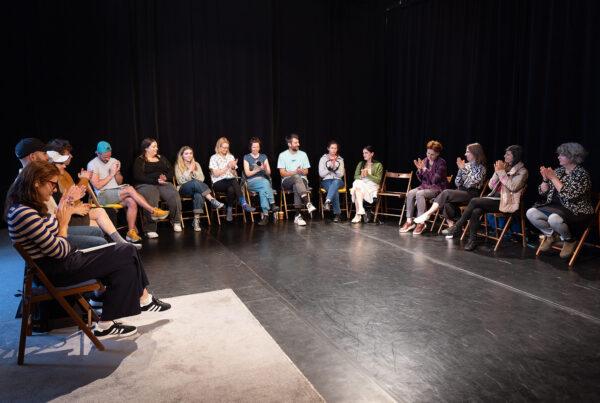Putting on stage plays based on translations.
I want to share the experience we have had, Hugo Arrevillaga Serrano (director), a group of Mexican actors, actresses and theater creators and me (translator), in the production of plays for young audiences in Mexico based on texts translated from French into Spanish. We have done Pacamambo (2007-2009) by Wajdi Mouawad (Quebec) and Désordre Public (Desorden Público, 2009-2010) by Evelyne de la Chenelière (Quebec) with our former company Tapioca Inn. And Assoiffés (Sedientos, 2011-2012) by Wajdi Mouawad (Quebec), S’embrasent (Abrasados, 2013-2015) by Luc Tartar (France) and Léon le nul (León el bueno para nada, 2016-2017) by Francis Monty (Quebec) as a new group in the last six years. These plays, in some cases, coproduced by Mexican public theater institutions and programs (Teatro Escolar / Instituto Nacional de Bellas Artes –INBA- and Teatro La Capilla / Fondo Nacional para la Cultura y las Artes –FONCA) have been presented during various seasons in different theaters in Mexico City and in festivals in Mexico. The longevity of these plays and its “happy marriages” with its audiences (children and adolescents from 8 years up), have been, in my opinion, due to three main reasons: 1) authors with a personal poetic, that build stories that leave out any moral judgement on their characters and actions and deal with topics that have been forbidden or rarely presented in the theater for young audiences in Mexico like sex and sexuality (S’embrasent), death (Pacamambo), suicide and the search for beauty (Assoiffés) and the demystification of the family as a “heaven” of peace and love (Léon le nul), 2) a good adaptation of these stories by the director and the performers, not by simplifying the story but by finding its proper rhythm, humour and tone in the translated language, 3) and programmers (like Boris Schoemann, theater translator and artistic director of La Capilla Theater, Monica Juárez, that used to be, for many years, responsible of Teatro Escolar –INBA- and Marisa Giménez Cacho who used to be in charge of Teatro para Niños y Jóvenes –INBA-) that are not afraid of taking risks with “foreign” texts and have faith that they can say something to their audiences in Mexico. This has been the key for us, not only to search and translate “foreign” texts, but also to produce and present them to the Mexican audiences: strong texts, sensible creators and intelligent and brave people directing public institutions.
Unluckily, this hasn’t been the case in the last three or four years in Mexico. The cutbacks in culture and specifically in theater have been enormous. And nowadays the creation in general, and for young audiences in specific, is in danger. The number of plays for young audiences produced or coproduced by public institutions have decreased dramatically. So at the end of day we, creators, have to produce our plays with our money. And then “if” programed in the public theaters receive as payment a percentage (that goes from the 60% to the 70%) of the box office. That is ridiculous since the price of a ticket for a spectacle of this kind goes from $2 to $5 American Dollars and the publicity coordinated by the institutions is not enough. So it is impossible to pay a decent salary to the team of 6 or 7 creators that participated in the creation of the spectacle.
The future of the creation for young audiences seems grim in Mexico. We really need a revalorization of our work starting with the help and guidance of the people in charge of the public institutions, who must convince the state and federal government to give enough economic resources to start, again, producing shows that will allow companies to keep doing their jobs and continue participating in the development of our theater for young audiences.
By Humberto Pérez Mortera



